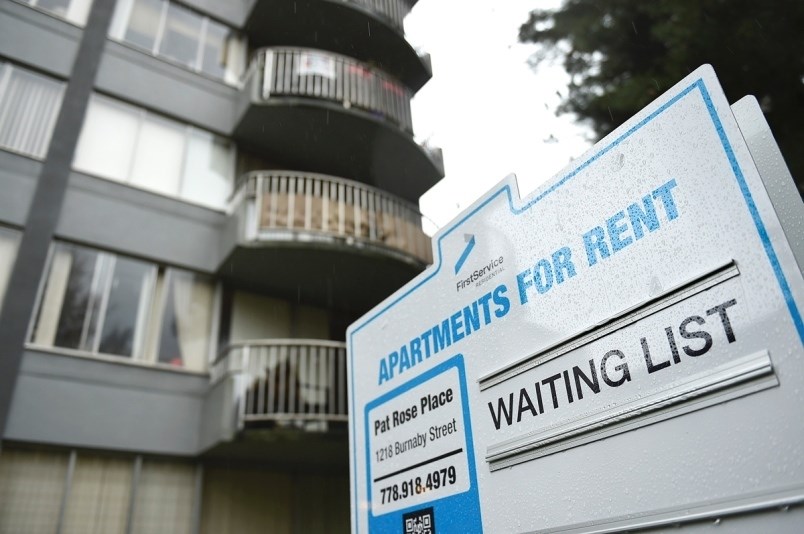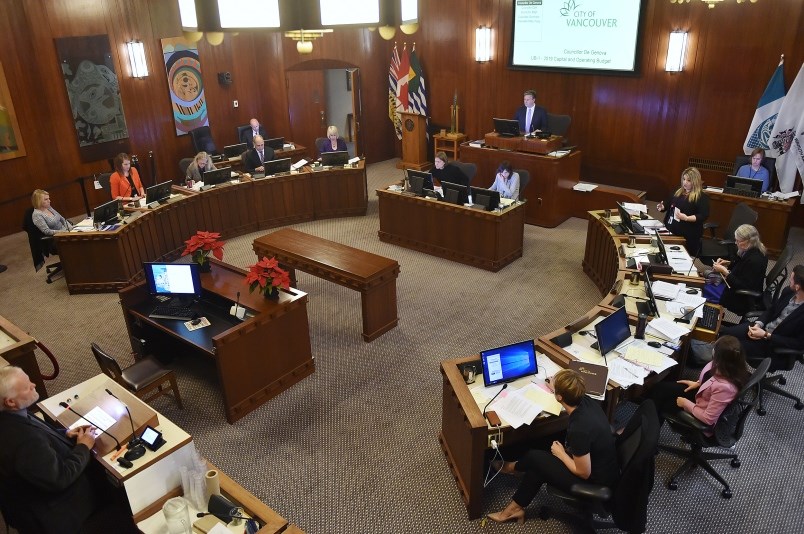Mayor Kennedy Stewart campaigned on a promise to hire a rentersâ advocate within his first 100 days in office but acknowledged Wednesdayâhis 100th day in officeâthat such a person is not in place and the reason is connected to him not having majority rule at city hall.
During his campaign last year to become mayor, Stewart identified six âpriority areasâ that he promised to see through in his first 100 days on the job. Near the top of the list was hiring a rentersâ advocate to better serve citizens in a city where more than 50 per cent pay rent.
âThatâs part of this not having a majority [on council],â said Stewart, who ran as an independent candidate in the Oct. 20 election, although he aligned himself with OneCity Coun. Christine Boyle during the campaign. âIf I had a majority, I probably would have hired one right away.â
The council is represented by five Non Partisan Association councillors, three Green Party councillors, one COPE councillor and Boyle. No one party on the 11-member council has a majority, unlike the previous administration of Vision Vancouver, which ruled city hall for 10 years.
Staff are currently examining what steps would be needed to set up a rentersâ office, including using expertise of current employees to handle legal questions posed by renters. Another option is funding existing renter advocacy groups to provide legal advice and better service to renters.
That work is being done because of a successful motion moved by Green Party Coun. Pete Fry last November to have staff examine the steps necessary to create a rentersâ office. Stewart gave Fry full credit for the motion and said a staff report will go before council âsoon.â
âApparently, there are a number of approaches that [city staff are] suggesting that Iâm open to listening to and working with council to find the best solution,â the mayor said at a news conference Wednesday at city hall to mark his first 100 days in office.
So will the city hire a rentersâ advocate, or not?
âIf I have my way, there will be,â he told reporters. âBut weâll have to see. Like I say, Iâm one vote on council. Once I get the staff report back, weâll have a good discussion. Iâll be making my pitch as well as I can. But whatever happens, we have to make sure that council invests in advocacy for renters.â

Last month, the city announced it hired a ârenter advocacy support services officer,â which was a job advertised before Stewart and the new council was elected. That personâs job will involve coordinating staff to improve services for renters, including working closely with existing advocacy groups.
The mayor told the Courier previously that he sees this role as supplementary to the work of a rentersâ advocate, who would be equipped to provide legal advice to renters. Stewart said Wednesday he hoped such an advocate would work out of an office easily accessible to the public.
âI would like a one-stop shop for renters, where they can not only get help and advocacy, but they can also get some legal advice,â he said. âIâll be pushing for that and trying to convince council this is the right thing to do.â
Sara Sagaii, a steering committee member of the Â鶹´«Ã½Ó³»Tenants Union, said Stewart should have kept his promise to hire an advocate but argued the rental crisis canât be âsolved or mitigatedâ by one person working out of city hall.
âWe really, strongly need policy change at the city level towards greater tenant protection and to stop the loss of affordable housing to renovictions and demovictions,â Sagaii said. âWe also need policy change at the provincial level to get stronger rent control and we need better investment in housing from all three levels of government.â
At the same time, Sagaii said, the tenantsâ union is pleased the cityâs affordable housing department is âlooking to work more closely with community groups and trying to advocate for tenants at city hall and change policies.â

The other five âpriority areasâ Stewart identified in his campaign were:
- Clear the permitting backlog: Stewart credited NPA Coun. Melissa De Genova for first acting to introduce a motion to do this. He noted an additional 43 staff have been hired to help reduce times people wait for building and other permits.
- Set up emergency overdose task force: Stewart formed the task force and successfully moved a series of recommendations before council, including providing another $500,000 directed at the overdose crisis and calling for a safe drug supply.
- Introduce conflict of interest rules: Council endorsed Stewartâs motion to have staff examine how the city can âbring in tough new conflict-of-interest rules.â Those rules would require elected officials to proactively disclose assets and prohibit them working outside city hall, if these activities are likely to conflict with their public duties. The rules would also prohibit officials and âkey staff membersâ from accepting government contracts or lobbying for 12 months after leaving their positions. No date has been set when staff will report back to council.
- Create lobbyist registry: Stewart said B.C. Municipal Affairs Minister Selina Robinson has directed ministry staff to begin discussions with Â鶹´«Ã½Ó³»city staff and other local governments who may be interested in such a registry.
- Launch small business review: âIâm happy to report that invitations to small businesses across our city have gone out for a roundtable discussion next week,â the mayor said. âThis is the first step in making sure we adopt policies that support and grow our neighbourhood-based economy.â
If Stewart were to assess his first 100 days in office with a letter grade, he said he would give himself a B+.
Why not an A?
âI have a lot more to learn,â said the former Burnaby NDP MP. âIâve been a politician for a while, but not a civic politician and I think getting to know the staff, getting to know the policiesâI have more homework to do on that.â
Added Stewart: âI would give my council an A-, though. I think theyâve been very open to compromise and have put forward some excellent motions.â
@Howellings
Ìý



